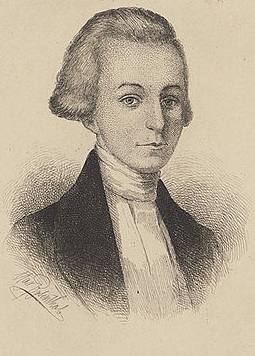William Duer
British subject William Duer (1743-99) was in Albany on a number of occasions - chiefly during the late 1770s and 1780s in conjunction with his duties in the Commisary Department of the Continental army. His overall story has been told in a number of incarnations. The purpose of this sketch is to place him in his brief Albany context.
Duer was the son of an English West Indian planter and the daughter of an English nobleman. Well educated and a veteran of British military and diplomatic service, he came to New York to secure a pipline of lumber for use on the family plantation on Antigua. Encouraged by Philip Schuyler, in 1768 he purchased 1,300 acres from members of the Bayard family and established a settlement on the East side of the upper Hudson about fifty miles north of Albany. At Fort Miller, he constructed saw, grist, and snuff mills, operated a store, and was trading extensively with the Albany business community including the Van Schaick brothers who would be among his many creditors.
In 1773, he went to England and returned with a contract to supply the Royal navy with timber for masts and spars. His connections within the provincial government led to an appointment as justice in newly formed Charlotte County in 1773.
 At the outbreak of hostilities in 1775, Duer found he had more in common with the colonists who were now revolutionaries and joined in the crusade for American liberty. Known in Albany as "Col. Duer," he served as an agent of the supply side of the War for Independence. By 1776, he was operating out of Albany. His Albany based deputies, New Englanders Eli Arnold and then Elisha Crane, were sent out in all directions to secure stores and supplies. He also appeared before the Albany committees on wartime business. Well-known in the region, he drew on wartime experience to launch a number of risky financial ventures that eventually landed him in "Debtors Prison" in New York City.
At the outbreak of hostilities in 1775, Duer found he had more in common with the colonists who were now revolutionaries and joined in the crusade for American liberty. Known in Albany as "Col. Duer," he served as an agent of the supply side of the War for Independence. By 1776, he was operating out of Albany. His Albany based deputies, New Englanders Eli Arnold and then Elisha Crane, were sent out in all directions to secure stores and supplies. He also appeared before the Albany committees on wartime business. Well-known in the region, he drew on wartime experience to launch a number of risky financial ventures that eventually landed him in "Debtors Prison" in New York City.
He was elected to the New York Provincial Congresses and then appointed to the Continental Congress where he signed the Articles of Confederation in 1778.
In July 1779, he married a younger Catherine Alexander, daughter of a patriot general who died in Albany in 1783. In February 1782, Duer had leased the parsonage of the Albany Dutch church for two years and settled his wife and growing family in it.
After the war, he re-located to Manhattan where he continued trading and speculating to further develop his holdings and was instrumental in the formation of the Bank of New York. He was elected to the State Assembly and was named deputy when Alexander Hamilton was appointed United States Secretary of the Treasury in 1789.In 1790, William Duer's New York City household was served by ten slaves. However, his checkered financial past soon caught up with him. His growing and wide-ranging portfolio of holdings were wiped out in the Panic of 1792. Duer was sued by his creditors and found little relief after he entered debtor's prison in New York in March 1792. Even in confinement, he continued to work employing clerks and agents to attempt to regain solvency. As his health deteoriated, he may have been released on parole for a time in 1798. That was short lived and he died in prison early in May 1799. William Duer had lived only fifty-seven years. His well-born widow and their eight children struggled after his passing.
His eldest son, William Alexander Duer, an attorney, jurist, and biographer of his father and grandfather, became president of Columbia University. A grandson served in the US House of Representatives. Widow Kitty Duer re-married and survived until 1826.
Fort Miller: "The village of Fort Miller recived its name from the fortifications on the west side of the Hudson and opposite the site of the village. These were constructed by Colonel Miller. The credit for the early development of this place is given to Judge William Duer, whose influence brought many settlers. He purchased a tract of land, including the falls, in 1768, and put up a gristmill. Afterwards he put up snuff mills and a powder mill." Copied from an online source.
Brothers Gerrit and John G. Van Schaick pursued Duer for payment for the rest of their lives. At least part of the debt was handed down from the estate of their father.